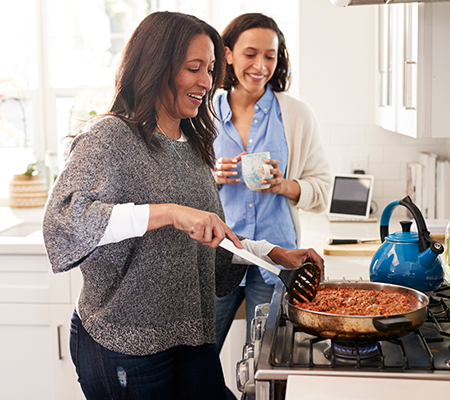 We all hope the holiday season is merry and bright, but getting sick will certainly put a damper on things. Unfortunately, during most years, there are viruses going around. And food poisoning is a constant possibility.
We all hope the holiday season is merry and bright, but getting sick will certainly put a damper on things. Unfortunately, during most years, there are viruses going around. And food poisoning is a constant possibility.
What is food poisoning?
Food poisoning is generally caused by a bacteria, virus or toxin that was present in food that someone consumed. The most common signs are rapid-onset nausea, vomiting, diarrhea or stomach ache. Sometimes you can feel weak, fatigued or have a fever.
“The key thing to remember for this type of illness is staying hydrated,” said Dr. Robin Henley, Marshfield Clinic Health System family medicine physician. “This often means drinking small sips of water every few minutes. Drinking large amounts of fluid quickly can cause vomiting, so it is best to keep fluid intake small and frequent.”
Dr. Henley adds that electrolyte beverages can be helpful if a lot of vomiting or sweating has occurred, but they’re not usually necessary. Sugary drinks and juices can worsen diarrhea, so water is generally the best choice.
In many cases, these symptoms will get better within 24 hours. But be careful not to eat too soon. Many people make this mistake. Only try food if you are tolerating fluids first. And when you are ready, opt for bland, high-fiber foods like whole wheat cereals, rice and bananas.
When to go to the doctor
If you are unable to tolerate any fluids without vomiting and this has been going on for several hours, it is time to seek treatment at a place that can administer IV fluids, if needed.
“The good way to gauge your hydration status at home is by monitoring urination,” Dr. Henley said. “If you haven’t urinated in 6-8 hours, you are likely dehydrated. And if you are not able to drink fluids to re-hydrate, it is time to seek care.”
Dr. Henley recommends seeking medical care if there is blood in your stool, because that could be a sign of a more serious infection.
Certain groups of people may need to seek care sooner than the average patient including:
- Infants and young children, who can get dehydrated more quickly.
- Elderly patients, who often have other medical conditions that could lead to more serious illness.
- Pregnant women, since dehydration could cause contractions.
- People with heart conditions, since they may be more sensitive to an electrolyte imbalance.
- Diabetic patients, since blood sugars could become too low or too high during illness.
- Anyone with a compromised immune system.
Healthy holiday habits
To avoid food poisoning, especially around the holidays. Dr. Henley’s top five tips are:
- Avoid raw, unpasteurized eggs. Beware – traditional egg nog can have raw eggs in it.
- Always wash fruits and vegetables before cutting them or eating them.
- Be wary of homemade canned goods, a common holiday gift. If the canned goods were not appropriately preserved or sealed, they could contain a rare but serious toxin from the bacteria that causes botulism.
- Limit the holiday buffet time. Most foods can generally be safely kept at room temperature for about two hours before they have to be refrigerated. After four hours, all uneaten food should be discarded.
- Throw away refrigerated leftovers after 3-4 days, and frozen leftovers after 1-2 months.

